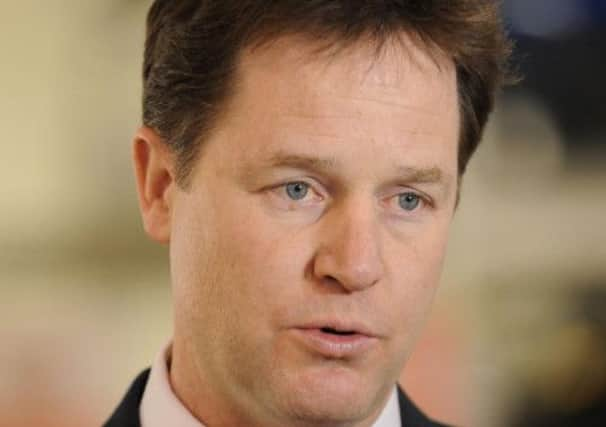Nick Clegg: No-go on snoopers’ charter


• Nick Clegg says “snoopers’ charter” will not happen while Lib Dems are in government
• Says Coalition Government will learn lessons from the past when “Labour overdid it”
Advertisement
Hide AdAdvertisement
Hide AdThe Liberal Democrat leader has mounted staunch resistance within the government to measures included in Home Secretary Theresa May’s proposed Communications Data Bill, which would allow the storage of details of website visits and social media contacts for each internet user. Reports this week suggested Mrs May has redrawn the legislation with concessions, in the hope of getting it included in the Queen’s Speech on 8 May.
But Mr Clegg indicated yesterday that he is ready to accept only minor technical changes to current practices – such as ensuring that every mobile device has its own unique “address” – and does not regard the large-scale retention of internet-use records as “workable or proportionate”.
Such data would be deemed a “treasure trove” of information to be mined by security officials
Speaking on his weekly Call Clegg radio phone-in on LBC, he said: “The snoopers’ charter is not going to happen.
“The idea was that the government would pass a law which means there would be a record kept of every website you visit, who you communicate with on social media sites. It is certainly not going to happen with Liberal Democrats in government.
“We all committed ourselves at the beginning of this coalition to learn the lessons from the past, when Labour overdid it, trying to constantly keep tabs on everyone. We have a commitment to end the storage of internet information unless there is a very good reason to do so.
“I have spoken to senior police officers and people from the security services. Of course we need to support them. They have got very significant powers already which I support them in deploying to go after criminals, to keep us safe.”
Mr Clegg said he did not believe the public would support the hoarding of huge amounts of information about internet use. And he said internet service providers had warned that such a scheme was “not necessarily technically feasible”.
Advertisement
Hide AdAdvertisement
Hide Ad“We have got to get the balance right between giving the police the tools they need to do the job, but doing so in a way that gets the balance right between liberty and security,” he said.
Prime Minister David Cameron’s official spokesman insisted that discussions are still “ongoing” within government on how best to help the police and security services respond to technological change. But the spokesman declined to give any details of what proposals remain on the table and refused to say whether the Communications Data Bill will feature in the Queen’s Speech in any form.
Shami Chakrabarti, of campaign group Liberty, said: “If the snoopers’ charter really is dead, that’s cause for significant celebration and relief.
“People live more and more of their intimate lives online and it was outrageous to suggest surveillance of the entire nation. Credit to all those in Parliament and beyond with the imagination and courage to block this terrifying plan.”
Emma Carr, deputy director of privacy at Big Brother Watch, said: “Nick Clegg has made the right decision for our economy and for our freedom. It would have made Britain a less attractive place to start a company and put British companies in the position of being paid by the government to spy on customers.”